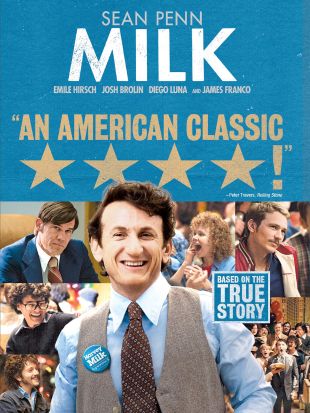As the first openly gay man to hold elected office in California, Harvey Milk served as the spokesperson for the gay rights movement in the '70s, in San Francisco, and by extension, the United States. Practically from the moment of his assassination in 1978, people have been trying to get Milk's remarkable life story onto the screen, and thanks to Gus Van Sant and Sean Penn, it was worth the wait. The movie follows the final years of Milk's life, starting when he leaves New York with his significant other, Scott Smith (James Franco), and opens a camera store in the now famous Castro District of San Francisco. He faces bigotry based on his sexual orientation, but responds with serious action, spearheading a campaign of activism that organizes the gay community into a group with genuine financial strength -- a strength Milk translates into political muscle. With his leadership, the community publicizes the unfair treatment often suffered at the hands of cops, who are occasionally physically abusive, and often can't be bothered to investigate the murders of gay men. All the while, Milk continues his attempts to win a seat on the city's Board of Supervisors, even as his devotion to politics leads to the breakdown of his relationship.
Dustin Lance Black's screenplay never holds Harvey Milk up as something bigger than he was -- he's never made into a martyr or a saint. He's a heroic, but complicated, three-dimensional person, and Sean Penn rises to the occasion with an empathetic performance that never rings false. He captures the charisma and drive that made Milk a born politician just as cannily as he does the flaws that made him a difficult life partner, and the intimate moments Milk shares with Smith are just as heartfelt as the scenes where he rallies thousands of angry protestors to march on city hall. Penn also gets expert support from everyone in the cast, especially Franco, who plays Smith's loyalty as unwavering, even when the their relationship becomes so strained that he must move out. The film also benefits from a nuanced performance by Diego Luna, who plays Jack Lira, another longtime companion of Milk. Although Lira is a grandly flamboyant character, Luna never condescends to playing him as a drama queen -- his histrionics always seem to come from the character rather than from a stereotype. And Emile Hirsch shines as Cleve Jones, the brainy, energetic runaway who turns out to be Milk's political right-hand man. Of course, director Gus Van Sant matches his lead actor's total commitment to the project. He doesn't shy away from the story's occasional stabs at operatic impact, but instead employs a recurring visual motif using mirrors and reflections to help these moments achieve maximum emotional effect. We see major and minor events transpire in mirrors, windows, and other items -- the most striking of which is an argument with a police officer viewed in the reflection of a metal whistle. This visual refrain, along with the measured but consistent use of opera on the soundtrack, helps make the ending an emotional powerhouse -- even though we know right from the start how Milk's life will end. Harvey Milk embodied the concept that "all politics is personal," and by presenting the famed Mayor of Castro Street's personal and public lives with such clarity and empathy, Van Sant has made something very rare in Hollywood -- a genuinely powerful political film that works equally well as a story of personal triumph.
